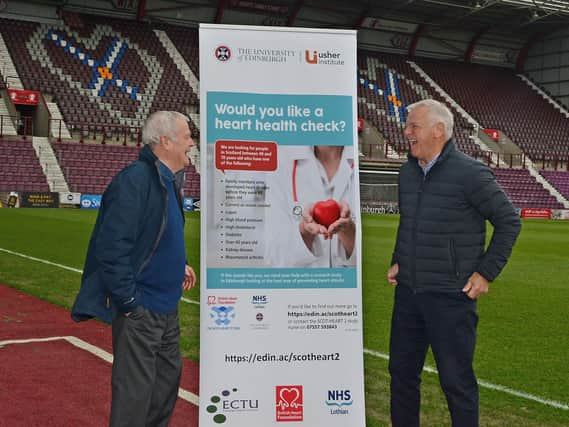Hearts legend Jim Jefferies helps launch new Edinburgh health study after heart attack on golf course six months ago


Tynecastle legend Jim Jefferies has teamed up with the cardiologist who helped save his life to support new research into preventing heart attacks.
The former Hearts coach had a heart attack on the golf course in East Lothian last September and was treated at Royal Infirmary Edinburgh by Professor David Newby.
Advertisement
Hide AdAdvertisement
Hide AdProf Newby is recruiting 6,000 people aged between 40-70 years old at increased risk from coronary heart disease for his study.
Heart attack
Jim Jefferies said: “When I had my heart attack, I was glad of the treatment that I received from Prof Newby and his team.
“The live-saving methods they used were based on years of research, which has reduced the number of deaths from heart attacks.
“I think any research we can do to bring these numbers down even further is a good thing and would encourage people to sign up for this clinical trial.”
Advertisement
Hide AdAdvertisement
Hide AdResearchers led by Prof Newby will compare two different ways of preventing heart problems to determine which is most effective.
Both Hearts and Hibs will promote the scheme and encourage their fans to enrol as part of the University of Edinburgh study.
Footballing greats Gary Locke and Pat Stanton joined Jim and Prof Newby for a launch event at Tynecastle stadium yesterday.
Doctors currently use what is known as a ‘risk score’ to help decide who needs advice and medication to prevent heart attacks.
Advertisement
Hide AdAdvertisement
Hide AdRisk scores are based on factors such as age, smoking habits and whether coronary heart disease runs in the family.
But these scores can be inaccurate - leading to some patients receiving unnecessary medication and others missing out on vital drugs.
The study, funded by the British Heart Foundation, will compare the use of risks scores with CT scans – a type of x-ray that gives a detailed 3D picture of your heart and its blood vessels.
The comparison with risk scores will help find out if making decisions based on a CT scan will stop too many people being given medicines unnecessarily and if it lowers the number of people having heart attacks.
Advertisement
Hide AdAdvertisement
Hide AdPrevious research by the team has found that receiving a CT scan changed the way patients with symptoms of coronary heart disease were diagnosed and treated.
Potential participants of the SCOT-HEART 2 trial will undergo an assessment to see if they are suitable to be part of the study.
If eligible, they will be randomly assigned to either a risk score or CT scan group. The CT scans will take place at the Royal Infirmary Edinburgh.
The research team will use the results to advise participants and their GP about whether a change in lifestyle is needed or if medications to prevent coronary heart disease should be prescribed.
Advertisement
Hide AdAdvertisement
Hide AdProf Newby said: “There are 10,000 hospital admissions a year in Scotland for people with heart attacks.
“We are hoping our research will help reduce this number and also the number of people taking unnecessary medications.”
Anyone willing to take part can register their interest by visiting the study website: https://edin.ac/scotheart2
Comment Guidelines
National World encourages reader discussion on our stories. User feedback, insights and back-and-forth exchanges add a rich layer of context to reporting. Please review our Community Guidelines before commenting.